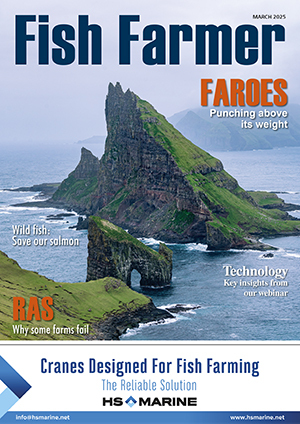Fish welfare complaints ‘can be taken out of context’

THERE has been a significant rise in the number of fish welfare complaints received by government agencies over the past 18 months.
Jenni Diffin of the Animal and Plant Health Agency (APHA), which works for Defra (Department for Environment, Food and Rural Affairs), told the Fish Veterinary Society conference in Edinburgh on Tuesday that her organisation has had to beef up its fish welfare team in Scotland.
This was in response to an increase in complaints against salmon farms, which come from ‘certain groups that most people will be aware of’, as well as from members of the public and the SSPCA (Scottish Society for the Prevention of Cruelty to Animals).
However, the complaints can be taken out of context, and an issue with a single fish can be interpreted as a problem with an entire farm.
‘The increase in complaints has come over the last 18 months; before, there were certain people who didn’t think we had anything to do with fish welfare so we weren’t receiving the complaints,’ said Diffin.
‘Now they’ve realised that we have a remit in it, that’s pushed it and also driven Scottish government to increase our capabilities to respond to these complaints.’
APHA is responsible for monitoring compliance with animal welfare regulations through routine welfare inspections, and responding to welfare complaints.
When APHA receives a complaint, its officers liaise with other bodies with welfare responsibilities, including the welfare inspectors of local authorities, the Fish Health Inspectorate (FHI) and Marine Scotland.
Diffin said a big increase in the public interest in fish welfare - prompted in part by programmes such as the BBC\'s Panorama special on salmon farming - was behind the ‘great increase in the number of fish complaints we have received’, and subsequently the number of fish inspections.
The reasons for complaints vary from high mortality events, chemical use and sea lice levels. Cleaner fish also feature, with ‘some sort of vague allegations of welfare abuse and unnecessary suffering’.
[caption id="attachment_87020" align="alignnone" width="300"] Graph showing reasons for complaints[/caption]
Diffin said APHA is often sent photographs with complaints.
‘The problem we sometimes have with these pictures is the complainants are taking these a little bit out of context,’ she said. ‘They are looking at a single fish and taking that as a welfare issue on a farm.’
The APHA team tends to assess the information it receives in collaboration with the FHI before carrying out visits, and will generally go out to the farm concerned with the FHI and sometimes the local authority as well.
At the farm, APHA wants to find out if there has been an incident, whether it is an environmental issue, a disease issue, when it happened and what actions took place.
‘If you’ve had an incident and you’ve been dealing with it, then you are doing what you can to protect the welfare of your fish.
‘Just as with any other heavily intensive industry, like pigs and poultry, we don’t expect incidents not to happen; it’s how they are dealt with,’ she said.
Diffin said they also receive complaints about by-product issues, because people don’t like to see fish morts being transported. APHA looks at the storage of mortalities, how they are transported, incinerators on sites, and disposal.
‘What quite often happens is we get complaints because people have seen large vehicles leaving fish sites with large numbers of mortalities.
‘They don’t look into the context of it, they just see a spike in mortalities so think there must be a welfare problem and report it.
‘That isn’t always the case but we are starting to see more and more of these complaints and I suspect it will continue to increase, so these visits will become more fundamental.’
The Fish Veterinary Society annual conference was held at the Norton House Hotel, Edinburgh, from March 3-4.
Maintenance Engineer (Electrical) - Mowi Scotland
Skye & Lochalsh£36,635 to £43,702 per annum
Apprentice Farm Technicians (South Uist) - Mowi Scotland
Isle of BenbeculaFrom £27,236 per annum
Freshwater Site Manager - Bakkafrost Scotland Limited
Tornapress£61,402.06 per annum
Hygiene Operative - Night - Bakkafrost Scotland Limited
Cairndow£22,313.50 to £23,429.18 per annum
Skipper (Beinn Mowi) - Mowi Scotland
Argyll & ButeFrom £34,861 per annum
